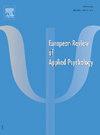情感需求对工作成果的影响:马来西亚辅导员的日记研究
IF 1.4
4区 心理学
Q3 PSYCHOLOGY, APPLIED
European Review of Applied Psychology-Revue Europeenne De Psychologie Appliquee
Pub Date : 2024-09-01
DOI:10.1016/j.erap.2023.100934
引用次数: 0
摘要
导言本研究探讨了马来西亚辅导员的情感需求对心理健康的影响。研究从工作需求-资源(JD-R)模型出发,测试了辅导员的日常情感需求对其离职意向的影响,主要是通过情感衰竭和抑郁症状。连续两周每周收集两天(周一和周五)的日记调查,测量个人对情感需求、一周水平的情感衰竭、抑郁症状和离职意向的自我报告(n = 188 个数据点)。为了验证所有假设,我们使用层次线性模型(HLM)对数据进行了分析。结果发现,辅导员的日常情感需求对其情感衰竭和抑郁症状水平有直接影响。研究发现,情绪衰竭(而非抑郁症状)可以调节日常情绪需求与离职意向之间的关系。结论总体而言,研究表明,日常情绪衰竭水平(而非抑郁症状)与辅导员的离职意向呈正相关。研究发现,情绪耗竭是辅导员情绪需求与离职意向之间关系的中介。情感需求和情感衰竭程度高的辅导员往往离职意向高。本文章由计算机程序翻译,如有差异,请以英文原文为准。
Effects of emotional demands on work outcomes: A diary study among Malaysian counsellors
Introduction
This study examined the effects of emotional demands on psychological health among counsellors in Malaysia. Drawing from the job demands–resources (JD-R) model, the research tested the effects of counsellors’ daily emotional demands on their turnover intention, mainly via emotional exhaustion and depressive symptoms.
Objectives
A within-individual design was used to examine the effects of counsellors’ emotional demands on their turnover intention, especially via emotional exhaustion and depressive symptoms.
Methods
The study was conducted among counsellors (n = 47) over a period of four days in two consecutive weeks. The diary survey was collected for two days (Monday and Friday) each week for two consecutive weeks, measuring individuals’ self-reports of emotional demands, week-level emotional exhaustion, depressive symptoms and turnover intention (n = 188 data points). To test all hypotheses, data were analysed using hierarchical linear modelling (HLM).
Results
Counsellors’ daily emotional demands were found have a direct effect on their levels of emotional exhaustion and depressive symptoms. Emotional exhaustion, but not depressive symptoms, was found to mediate the association of daily emotional demands with turnover intention.
Conclusion
Overall, the study revealed that the daily level of emotional exhaustion, but not of depressive symptoms, was positively related to counsellors’ turnover intention. Emotional exhaustion was found to mediate the relationship between counsellors’ emotional demands and their turnover intention. Counsellors with a high level of emotional demands as well as emotional exhaustion tended to have a high level of turnover intention.
求助全文
通过发布文献求助,成功后即可免费获取论文全文。
去求助
来源期刊

European Review of Applied Psychology-Revue Europeenne De Psychologie Appliquee
PSYCHOLOGY, APPLIED-
CiteScore
2.20
自引率
20.00%
发文量
38
期刊介绍:
The aim of the Revue européenne de Psychologie appliquée / European Review of Applied Psychology is to promote high-quality applications of psychology to all areas of specialization, and to foster exchange among researchers and professionals. Its policy is to attract a wide range of contributions, including empirical research, overviews of target issues, case studies, descriptions of instruments for research and diagnosis, and theoretical work related to applied psychology. In all cases, authors will refer to published and verificable facts, whether established in the study being reported or in earlier publications.
 求助内容:
求助内容: 应助结果提醒方式:
应助结果提醒方式:


